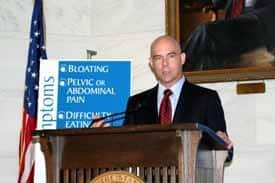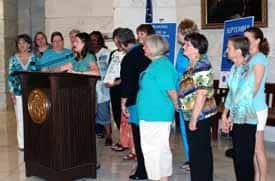Ovarian Cancer Survivors Gather to Raise Awareness
Sept. 2, 2009 | A grassroots group is hoping to raise awareness of a disease that claimed the lives of 130 Arkansas women last year. The Arkansas Ovarian Cancer Coalition, in conjunction with the University of Arkansas for Medical Sciences (UAMS), held its third annual Ovarian Cancer Awareness Rally at the state Capitol on Aug. 31. Survivors and their loved ones gathered to educate the public about early detection of this often misdiagnosed disease. Other sponsors of the rally were the Arkansas Cancer Coalition and the New Outlook Program at St. Vincent Health System. Ovarian cancer symptoms can be subtle, but must not be overlooked, said Alexander “Sandy” Burnett, M.D., chief of the Division of Gynecologic Oncology in the UAMS Winthrop P. Rockefeller Cancer Institute. ”Our homeruns come when we can diagnose the disease in its early stages, and I look forward to the day when there is a routine test that can be conducted in a doctor’s office to detect ovarian cancer,” he added. Symptoms of ovarian cancer include persistent bloating, pelvic or stomach pain, feeling full quickly after eating, and changes in bowel or urinary habits. If found in its earliest stage, ovarian cancer has a cure rate of 95 percent, but because its symptoms often mimic those of gastrointestinal disorders, they are often overlooked until the disease has significantly progressed. Carrie Bumgardner, a three-year ovarian cancer survivor, addressed the group about her experience with the disease. “We need to act like survivors, not victims,” she said. “It’s time for us to be informed on the signs, symptoms, statistics and need for early detection.” Bumgardner was correctly diagnosed at age 26 after previously being told that her symptoms were due to a pulled muscle, problems with her gallbladder and a cyst. The program also included the reading by Arkansas state Rep. Kathy Webb of a proclamation naming September Ovarian Cancer Awareness Month in Arkansas, and an update on the development of early-stage ovarian cancer testing by Robbie Linn, president of Stage I Diagnostics Inc. A luncheon at the Governor’s Mansion followed the rally. Gov. Mike Beebe, whose mother experienced ovarian cancer, addressed the group, along with Leah Elliott, a survivor and chairwoman of the coalition. Kim Norton of Little Rock provided musical entertainment. According to the American Cancer Society, about 21,550 new cases of ovarian cancer are expected to be diagnosed in the United States in 2009, resulting in about 14,600 deaths. A woman’s risk of contracting invasive ovarian cancer in her lifetime is about 1 in 71.
|


